Brain and Behavior: Bipolar Disorder's Neurological Aspects Explained
VerifiedAdded on 2022/09/12
|8
|1755
|9
Essay
AI Summary
This essay provides an in-depth analysis of bipolar disorder, focusing on its neurological effects. It begins by defining bipolar disorder and its different types, including Bipolar I, Bipolar II, and Cyclothymic Disorder, highlighting the diagnostic challenges due to the variability of symptoms. The essay then delves into the neurological impacts, discussing enlarged ventricles, and the similarities between bipolar disorder and schizophrenia. The roles of neurotransmitters like noradrenaline, serotonin, and dopamine are examined, along with their connection to mood disorders. Brain regions such as the prefrontal cortex, hippocampus, and anterior cingulate cortex are highlighted for their involvement. The essay concludes with recent findings, including altered potassium levels in neurons, differences in genes influencing cognition, and distinct brain abnormalities in relatives of individuals with schizophrenia or bipolar disorder. The essay emphasizes the ongoing research and the potential for new therapeutic approaches.
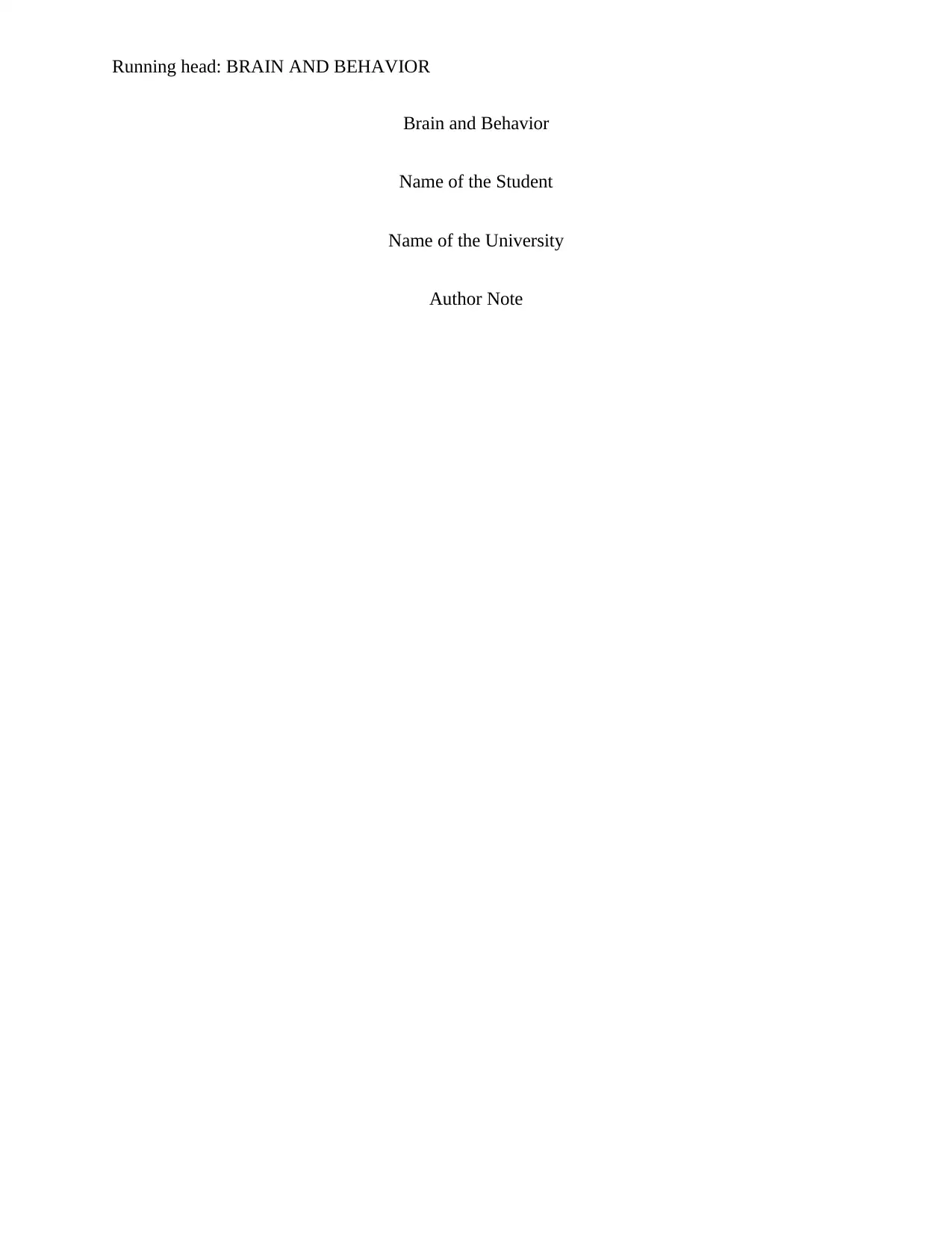
Running head: BRAIN AND BEHAVIOR
Brain and Behavior
Name of the Student
Name of the University
Author Note
Brain and Behavior
Name of the Student
Name of the University
Author Note
Paraphrase This Document
Need a fresh take? Get an instant paraphrase of this document with our AI Paraphraser
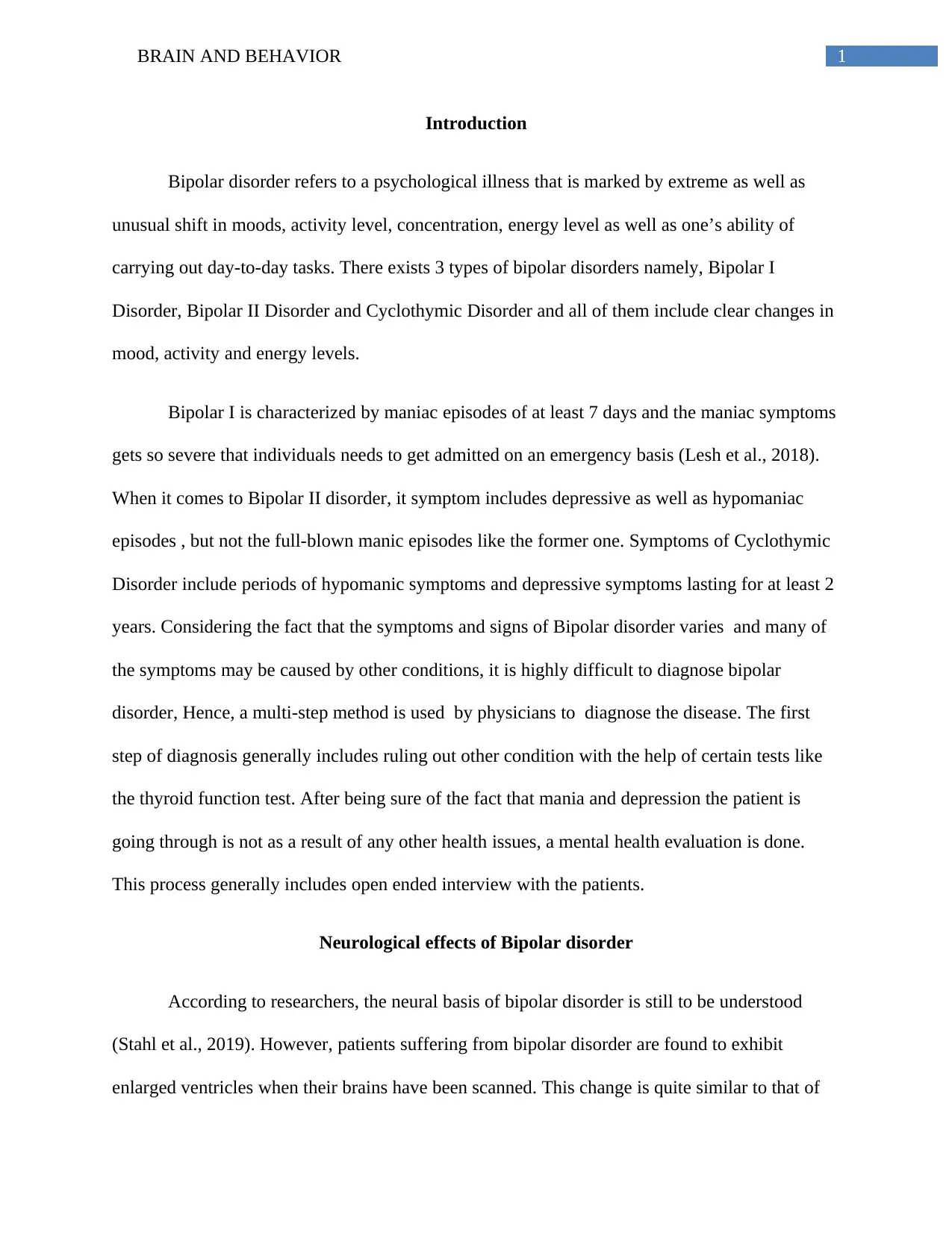
1BRAIN AND BEHAVIOR
Introduction
Bipolar disorder refers to a psychological illness that is marked by extreme as well as
unusual shift in moods, activity level, concentration, energy level as well as one’s ability of
carrying out day-to-day tasks. There exists 3 types of bipolar disorders namely, Bipolar I
Disorder, Bipolar II Disorder and Cyclothymic Disorder and all of them include clear changes in
mood, activity and energy levels.
Bipolar I is characterized by maniac episodes of at least 7 days and the maniac symptoms
gets so severe that individuals needs to get admitted on an emergency basis (Lesh et al., 2018).
When it comes to Bipolar II disorder, it symptom includes depressive as well as hypomaniac
episodes , but not the full-blown manic episodes like the former one. Symptoms of Cyclothymic
Disorder include periods of hypomanic symptoms and depressive symptoms lasting for at least 2
years. Considering the fact that the symptoms and signs of Bipolar disorder varies and many of
the symptoms may be caused by other conditions, it is highly difficult to diagnose bipolar
disorder, Hence, a multi-step method is used by physicians to diagnose the disease. The first
step of diagnosis generally includes ruling out other condition with the help of certain tests like
the thyroid function test. After being sure of the fact that mania and depression the patient is
going through is not as a result of any other health issues, a mental health evaluation is done.
This process generally includes open ended interview with the patients.
Neurological effects of Bipolar disorder
According to researchers, the neural basis of bipolar disorder is still to be understood
(Stahl et al., 2019). However, patients suffering from bipolar disorder are found to exhibit
enlarged ventricles when their brains have been scanned. This change is quite similar to that of
Introduction
Bipolar disorder refers to a psychological illness that is marked by extreme as well as
unusual shift in moods, activity level, concentration, energy level as well as one’s ability of
carrying out day-to-day tasks. There exists 3 types of bipolar disorders namely, Bipolar I
Disorder, Bipolar II Disorder and Cyclothymic Disorder and all of them include clear changes in
mood, activity and energy levels.
Bipolar I is characterized by maniac episodes of at least 7 days and the maniac symptoms
gets so severe that individuals needs to get admitted on an emergency basis (Lesh et al., 2018).
When it comes to Bipolar II disorder, it symptom includes depressive as well as hypomaniac
episodes , but not the full-blown manic episodes like the former one. Symptoms of Cyclothymic
Disorder include periods of hypomanic symptoms and depressive symptoms lasting for at least 2
years. Considering the fact that the symptoms and signs of Bipolar disorder varies and many of
the symptoms may be caused by other conditions, it is highly difficult to diagnose bipolar
disorder, Hence, a multi-step method is used by physicians to diagnose the disease. The first
step of diagnosis generally includes ruling out other condition with the help of certain tests like
the thyroid function test. After being sure of the fact that mania and depression the patient is
going through is not as a result of any other health issues, a mental health evaluation is done.
This process generally includes open ended interview with the patients.
Neurological effects of Bipolar disorder
According to researchers, the neural basis of bipolar disorder is still to be understood
(Stahl et al., 2019). However, patients suffering from bipolar disorder are found to exhibit
enlarged ventricles when their brains have been scanned. This change is quite similar to that of
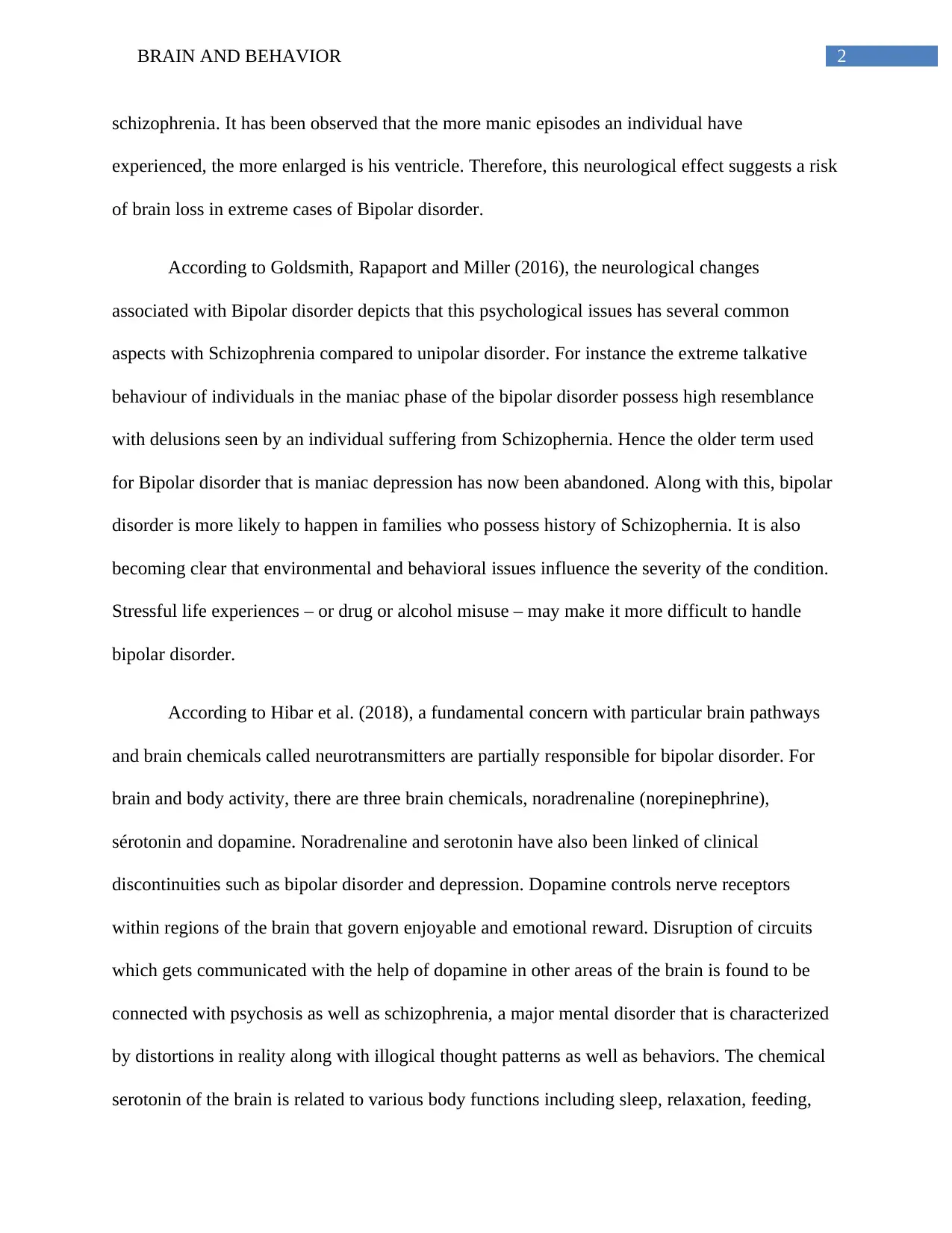
2BRAIN AND BEHAVIOR
schizophrenia. It has been observed that the more manic episodes an individual have
experienced, the more enlarged is his ventricle. Therefore, this neurological effect suggests a risk
of brain loss in extreme cases of Bipolar disorder.
According to Goldsmith, Rapaport and Miller (2016), the neurological changes
associated with Bipolar disorder depicts that this psychological issues has several common
aspects with Schizophrenia compared to unipolar disorder. For instance the extreme talkative
behaviour of individuals in the maniac phase of the bipolar disorder possess high resemblance
with delusions seen by an individual suffering from Schizophernia. Hence the older term used
for Bipolar disorder that is maniac depression has now been abandoned. Along with this, bipolar
disorder is more likely to happen in families who possess history of Schizophernia. It is also
becoming clear that environmental and behavioral issues influence the severity of the condition.
Stressful life experiences – or drug or alcohol misuse – may make it more difficult to handle
bipolar disorder.
According to Hibar et al. (2018), a fundamental concern with particular brain pathways
and brain chemicals called neurotransmitters are partially responsible for bipolar disorder. For
brain and body activity, there are three brain chemicals, noradrenaline (norepinephrine),
sérotonin and dopamine. Noradrenaline and serotonin have also been linked of clinical
discontinuities such as bipolar disorder and depression. Dopamine controls nerve receptors
within regions of the brain that govern enjoyable and emotional reward. Disruption of circuits
which gets communicated with the help of dopamine in other areas of the brain is found to be
connected with psychosis as well as schizophrenia, a major mental disorder that is characterized
by distortions in reality along with illogical thought patterns as well as behaviors. The chemical
serotonin of the brain is related to various body functions including sleep, relaxation, feeding,
schizophrenia. It has been observed that the more manic episodes an individual have
experienced, the more enlarged is his ventricle. Therefore, this neurological effect suggests a risk
of brain loss in extreme cases of Bipolar disorder.
According to Goldsmith, Rapaport and Miller (2016), the neurological changes
associated with Bipolar disorder depicts that this psychological issues has several common
aspects with Schizophrenia compared to unipolar disorder. For instance the extreme talkative
behaviour of individuals in the maniac phase of the bipolar disorder possess high resemblance
with delusions seen by an individual suffering from Schizophernia. Hence the older term used
for Bipolar disorder that is maniac depression has now been abandoned. Along with this, bipolar
disorder is more likely to happen in families who possess history of Schizophernia. It is also
becoming clear that environmental and behavioral issues influence the severity of the condition.
Stressful life experiences – or drug or alcohol misuse – may make it more difficult to handle
bipolar disorder.
According to Hibar et al. (2018), a fundamental concern with particular brain pathways
and brain chemicals called neurotransmitters are partially responsible for bipolar disorder. For
brain and body activity, there are three brain chemicals, noradrenaline (norepinephrine),
sérotonin and dopamine. Noradrenaline and serotonin have also been linked of clinical
discontinuities such as bipolar disorder and depression. Dopamine controls nerve receptors
within regions of the brain that govern enjoyable and emotional reward. Disruption of circuits
which gets communicated with the help of dopamine in other areas of the brain is found to be
connected with psychosis as well as schizophrenia, a major mental disorder that is characterized
by distortions in reality along with illogical thought patterns as well as behaviors. The chemical
serotonin of the brain is related to various body functions including sleep, relaxation, feeding,
⊘ This is a preview!⊘
Do you want full access?
Subscribe today to unlock all pages.

Trusted by 1+ million students worldwide
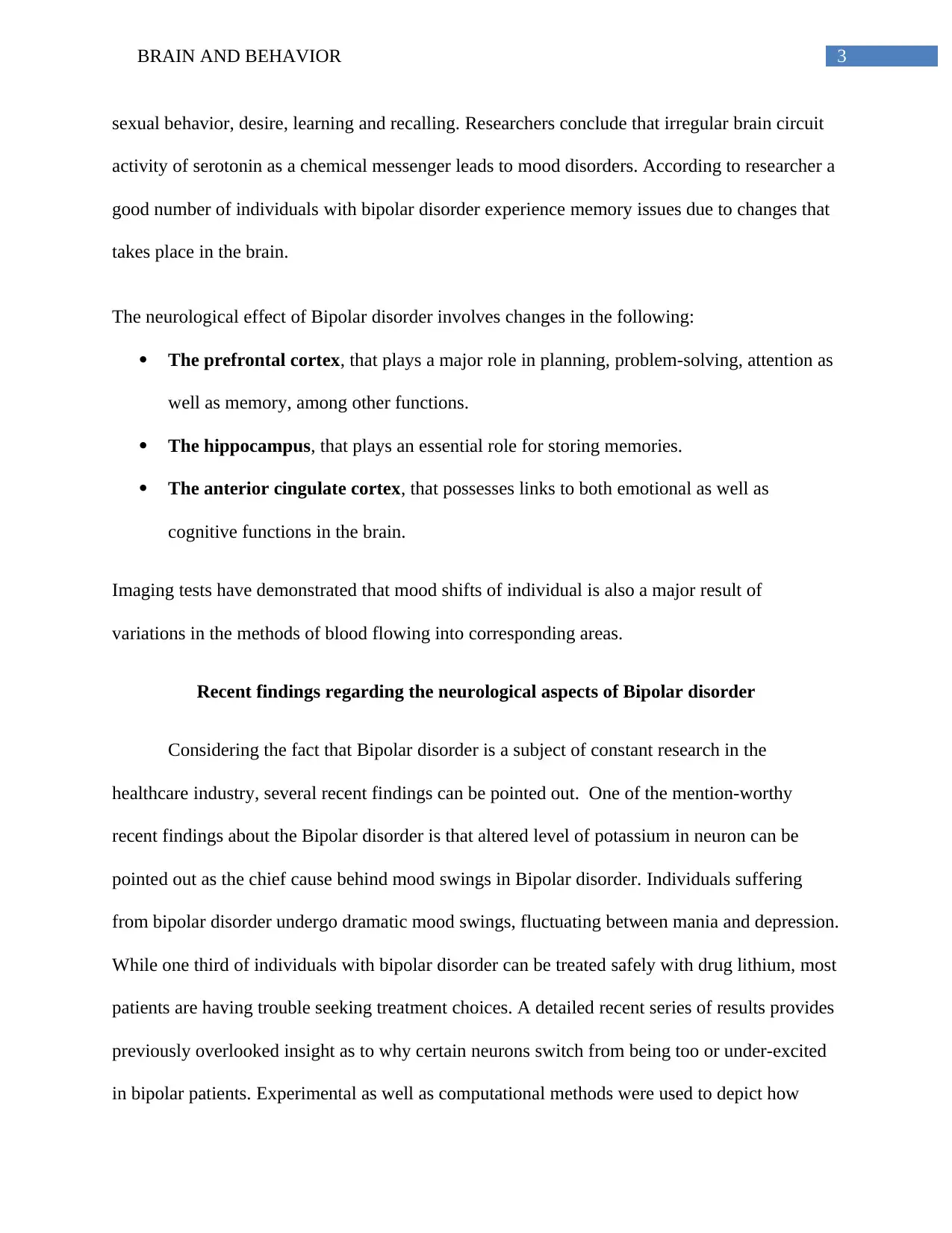
3BRAIN AND BEHAVIOR
sexual behavior, desire, learning and recalling. Researchers conclude that irregular brain circuit
activity of serotonin as a chemical messenger leads to mood disorders. According to researcher a
good number of individuals with bipolar disorder experience memory issues due to changes that
takes place in the brain.
The neurological effect of Bipolar disorder involves changes in the following:
The prefrontal cortex, that plays a major role in planning, problem-solving, attention as
well as memory, among other functions.
The hippocampus, that plays an essential role for storing memories.
The anterior cingulate cortex, that possesses links to both emotional as well as
cognitive functions in the brain.
Imaging tests have demonstrated that mood shifts of individual is also a major result of
variations in the methods of blood flowing into corresponding areas.
Recent findings regarding the neurological aspects of Bipolar disorder
Considering the fact that Bipolar disorder is a subject of constant research in the
healthcare industry, several recent findings can be pointed out. One of the mention-worthy
recent findings about the Bipolar disorder is that altered level of potassium in neuron can be
pointed out as the chief cause behind mood swings in Bipolar disorder. Individuals suffering
from bipolar disorder undergo dramatic mood swings, fluctuating between mania and depression.
While one third of individuals with bipolar disorder can be treated safely with drug lithium, most
patients are having trouble seeking treatment choices. A detailed recent series of results provides
previously overlooked insight as to why certain neurons switch from being too or under-excited
in bipolar patients. Experimental as well as computational methods were used to depict how
sexual behavior, desire, learning and recalling. Researchers conclude that irregular brain circuit
activity of serotonin as a chemical messenger leads to mood disorders. According to researcher a
good number of individuals with bipolar disorder experience memory issues due to changes that
takes place in the brain.
The neurological effect of Bipolar disorder involves changes in the following:
The prefrontal cortex, that plays a major role in planning, problem-solving, attention as
well as memory, among other functions.
The hippocampus, that plays an essential role for storing memories.
The anterior cingulate cortex, that possesses links to both emotional as well as
cognitive functions in the brain.
Imaging tests have demonstrated that mood shifts of individual is also a major result of
variations in the methods of blood flowing into corresponding areas.
Recent findings regarding the neurological aspects of Bipolar disorder
Considering the fact that Bipolar disorder is a subject of constant research in the
healthcare industry, several recent findings can be pointed out. One of the mention-worthy
recent findings about the Bipolar disorder is that altered level of potassium in neuron can be
pointed out as the chief cause behind mood swings in Bipolar disorder. Individuals suffering
from bipolar disorder undergo dramatic mood swings, fluctuating between mania and depression.
While one third of individuals with bipolar disorder can be treated safely with drug lithium, most
patients are having trouble seeking treatment choices. A detailed recent series of results provides
previously overlooked insight as to why certain neurons switch from being too or under-excited
in bipolar patients. Experimental as well as computational methods were used to depict how
Paraphrase This Document
Need a fresh take? Get an instant paraphrase of this document with our AI Paraphraser
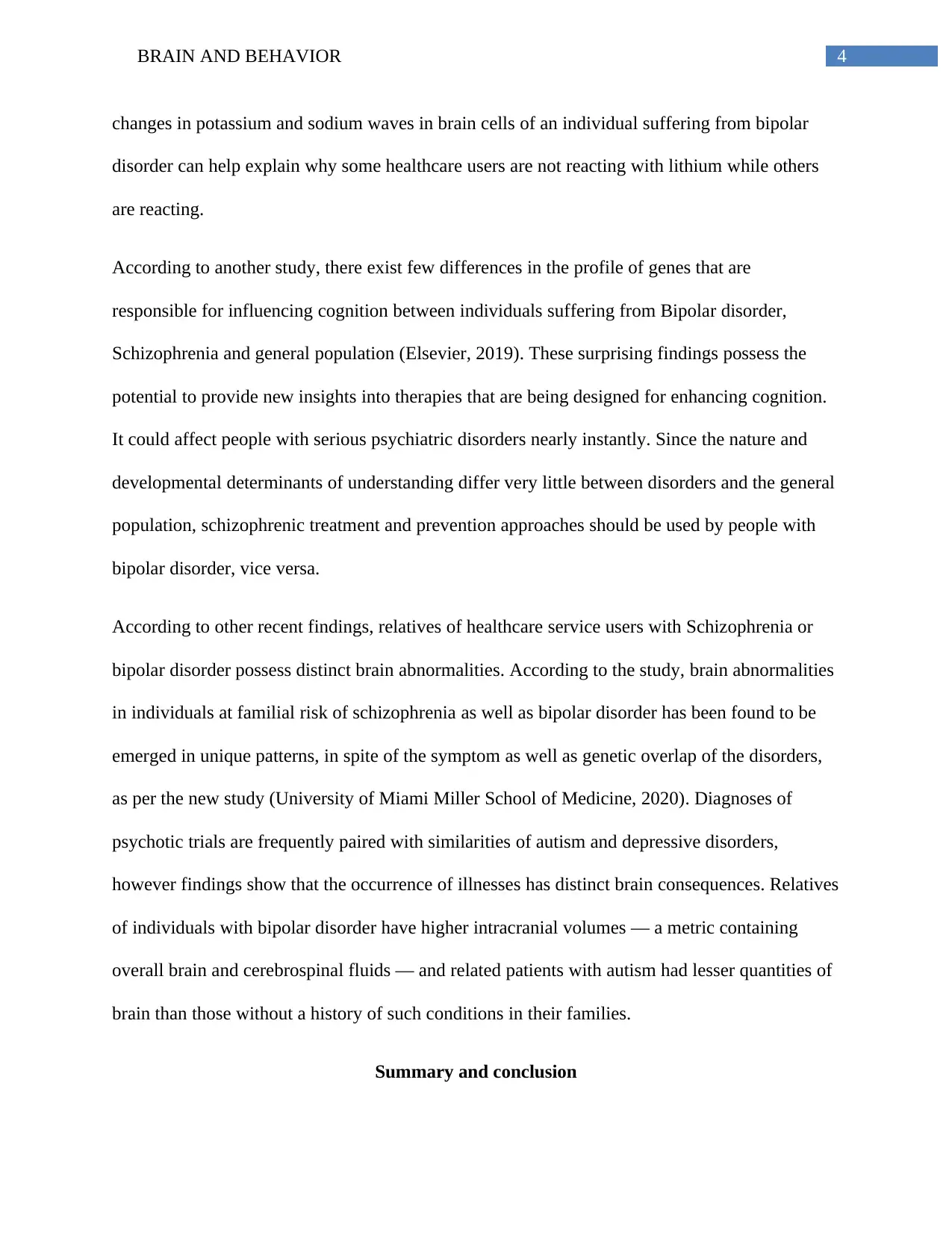
4BRAIN AND BEHAVIOR
changes in potassium and sodium waves in brain cells of an individual suffering from bipolar
disorder can help explain why some healthcare users are not reacting with lithium while others
are reacting.
According to another study, there exist few differences in the profile of genes that are
responsible for influencing cognition between individuals suffering from Bipolar disorder,
Schizophrenia and general population (Elsevier, 2019). These surprising findings possess the
potential to provide new insights into therapies that are being designed for enhancing cognition.
It could affect people with serious psychiatric disorders nearly instantly. Since the nature and
developmental determinants of understanding differ very little between disorders and the general
population, schizophrenic treatment and prevention approaches should be used by people with
bipolar disorder, vice versa.
According to other recent findings, relatives of healthcare service users with Schizophrenia or
bipolar disorder possess distinct brain abnormalities. According to the study, brain abnormalities
in individuals at familial risk of schizophrenia as well as bipolar disorder has been found to be
emerged in unique patterns, in spite of the symptom as well as genetic overlap of the disorders,
as per the new study (University of Miami Miller School of Medicine, 2020). Diagnoses of
psychotic trials are frequently paired with similarities of autism and depressive disorders,
however findings show that the occurrence of illnesses has distinct brain consequences. Relatives
of individuals with bipolar disorder have higher intracranial volumes — a metric containing
overall brain and cerebrospinal fluids — and related patients with autism had lesser quantities of
brain than those without a history of such conditions in their families.
Summary and conclusion
changes in potassium and sodium waves in brain cells of an individual suffering from bipolar
disorder can help explain why some healthcare users are not reacting with lithium while others
are reacting.
According to another study, there exist few differences in the profile of genes that are
responsible for influencing cognition between individuals suffering from Bipolar disorder,
Schizophrenia and general population (Elsevier, 2019). These surprising findings possess the
potential to provide new insights into therapies that are being designed for enhancing cognition.
It could affect people with serious psychiatric disorders nearly instantly. Since the nature and
developmental determinants of understanding differ very little between disorders and the general
population, schizophrenic treatment and prevention approaches should be used by people with
bipolar disorder, vice versa.
According to other recent findings, relatives of healthcare service users with Schizophrenia or
bipolar disorder possess distinct brain abnormalities. According to the study, brain abnormalities
in individuals at familial risk of schizophrenia as well as bipolar disorder has been found to be
emerged in unique patterns, in spite of the symptom as well as genetic overlap of the disorders,
as per the new study (University of Miami Miller School of Medicine, 2020). Diagnoses of
psychotic trials are frequently paired with similarities of autism and depressive disorders,
however findings show that the occurrence of illnesses has distinct brain consequences. Relatives
of individuals with bipolar disorder have higher intracranial volumes — a metric containing
overall brain and cerebrospinal fluids — and related patients with autism had lesser quantities of
brain than those without a history of such conditions in their families.
Summary and conclusion
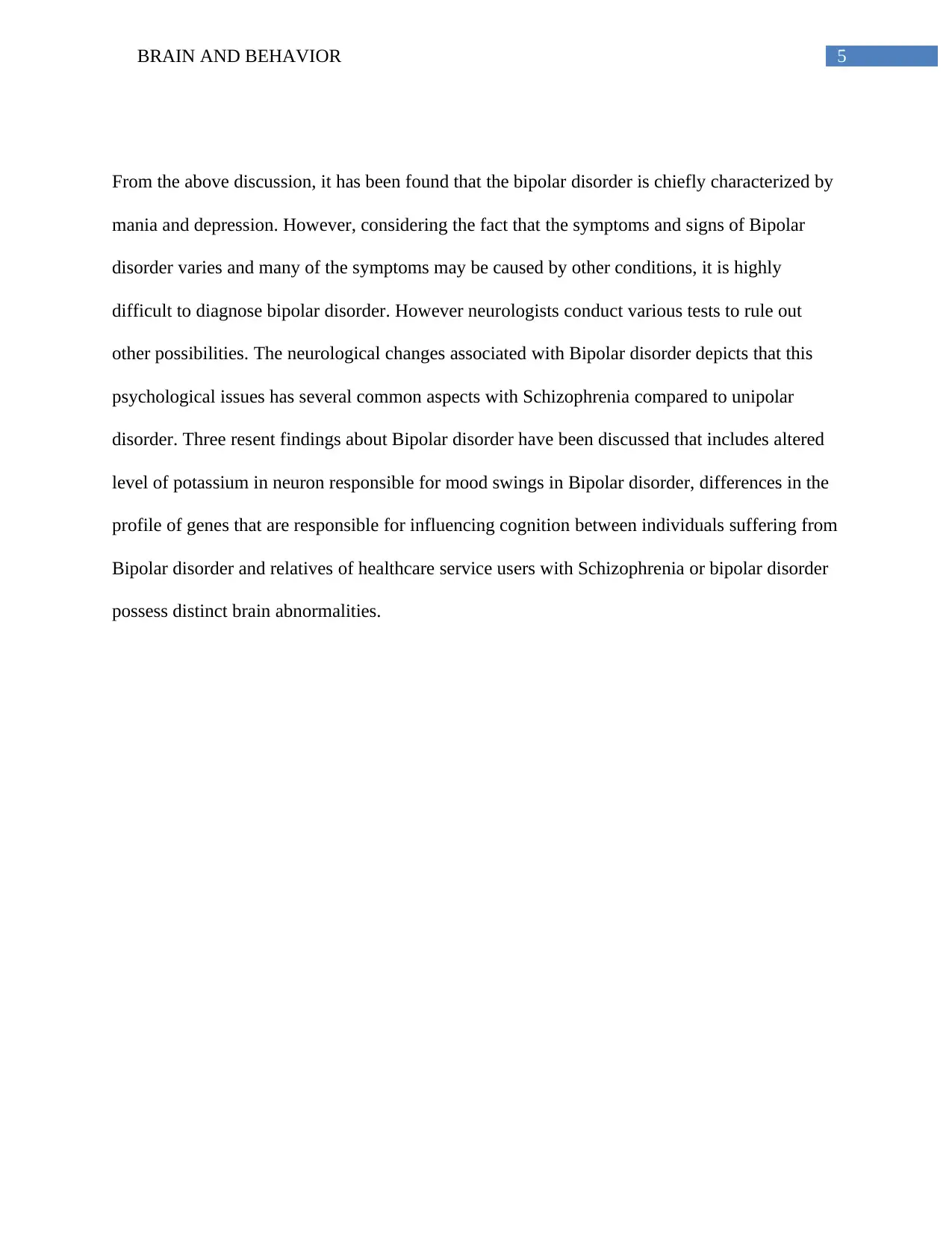
5BRAIN AND BEHAVIOR
From the above discussion, it has been found that the bipolar disorder is chiefly characterized by
mania and depression. However, considering the fact that the symptoms and signs of Bipolar
disorder varies and many of the symptoms may be caused by other conditions, it is highly
difficult to diagnose bipolar disorder. However neurologists conduct various tests to rule out
other possibilities. The neurological changes associated with Bipolar disorder depicts that this
psychological issues has several common aspects with Schizophrenia compared to unipolar
disorder. Three resent findings about Bipolar disorder have been discussed that includes altered
level of potassium in neuron responsible for mood swings in Bipolar disorder, differences in the
profile of genes that are responsible for influencing cognition between individuals suffering from
Bipolar disorder and relatives of healthcare service users with Schizophrenia or bipolar disorder
possess distinct brain abnormalities.
From the above discussion, it has been found that the bipolar disorder is chiefly characterized by
mania and depression. However, considering the fact that the symptoms and signs of Bipolar
disorder varies and many of the symptoms may be caused by other conditions, it is highly
difficult to diagnose bipolar disorder. However neurologists conduct various tests to rule out
other possibilities. The neurological changes associated with Bipolar disorder depicts that this
psychological issues has several common aspects with Schizophrenia compared to unipolar
disorder. Three resent findings about Bipolar disorder have been discussed that includes altered
level of potassium in neuron responsible for mood swings in Bipolar disorder, differences in the
profile of genes that are responsible for influencing cognition between individuals suffering from
Bipolar disorder and relatives of healthcare service users with Schizophrenia or bipolar disorder
possess distinct brain abnormalities.
⊘ This is a preview!⊘
Do you want full access?
Subscribe today to unlock all pages.

Trusted by 1+ million students worldwide
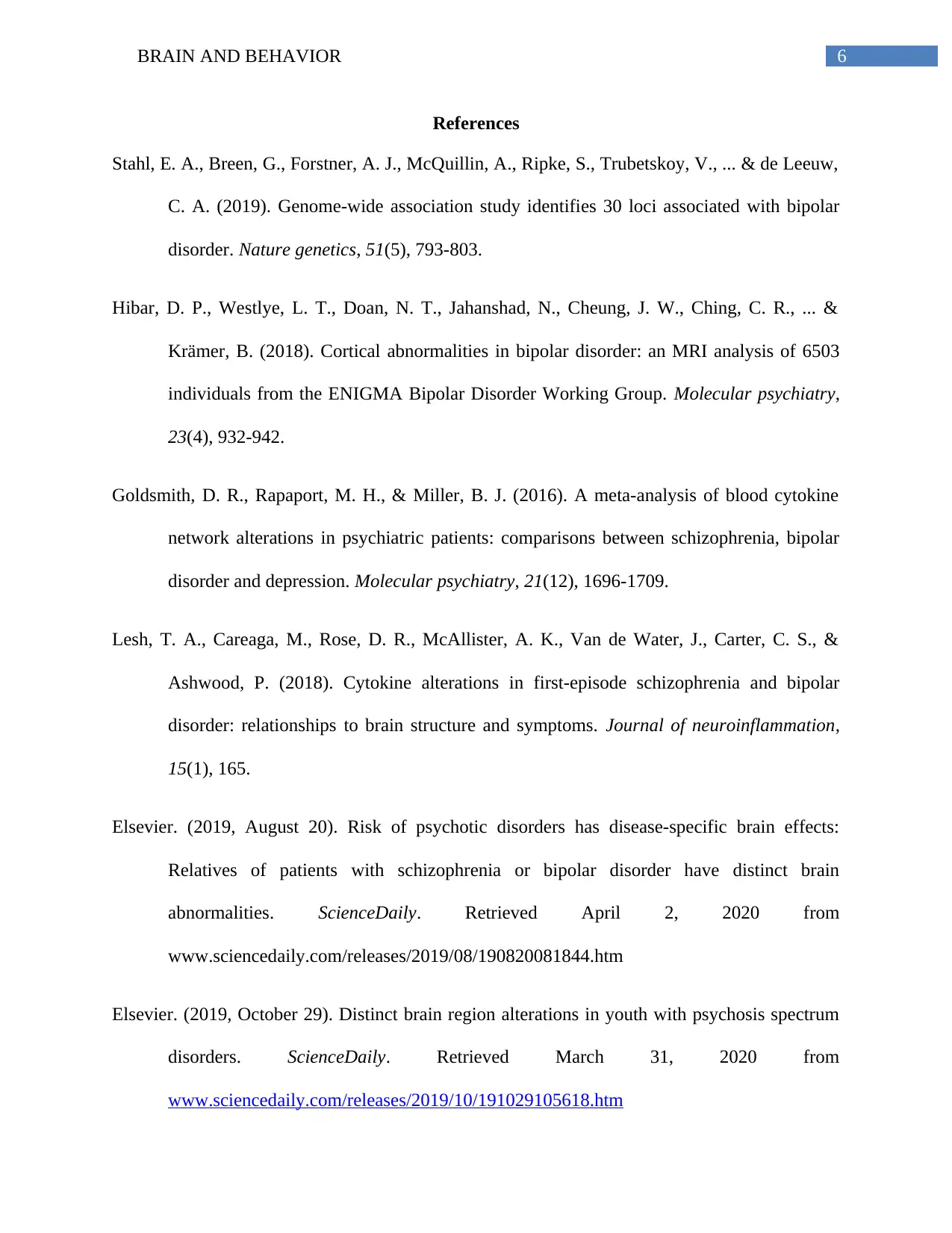
6BRAIN AND BEHAVIOR
References
Stahl, E. A., Breen, G., Forstner, A. J., McQuillin, A., Ripke, S., Trubetskoy, V., ... & de Leeuw,
C. A. (2019). Genome-wide association study identifies 30 loci associated with bipolar
disorder. Nature genetics, 51(5), 793-803.
Hibar, D. P., Westlye, L. T., Doan, N. T., Jahanshad, N., Cheung, J. W., Ching, C. R., ... &
Krämer, B. (2018). Cortical abnormalities in bipolar disorder: an MRI analysis of 6503
individuals from the ENIGMA Bipolar Disorder Working Group. Molecular psychiatry,
23(4), 932-942.
Goldsmith, D. R., Rapaport, M. H., & Miller, B. J. (2016). A meta-analysis of blood cytokine
network alterations in psychiatric patients: comparisons between schizophrenia, bipolar
disorder and depression. Molecular psychiatry, 21(12), 1696-1709.
Lesh, T. A., Careaga, M., Rose, D. R., McAllister, A. K., Van de Water, J., Carter, C. S., &
Ashwood, P. (2018). Cytokine alterations in first-episode schizophrenia and bipolar
disorder: relationships to brain structure and symptoms. Journal of neuroinflammation,
15(1), 165.
Elsevier. (2019, August 20). Risk of psychotic disorders has disease-specific brain effects:
Relatives of patients with schizophrenia or bipolar disorder have distinct brain
abnormalities. ScienceDaily. Retrieved April 2, 2020 from
www.sciencedaily.com/releases/2019/08/190820081844.htm
Elsevier. (2019, October 29). Distinct brain region alterations in youth with psychosis spectrum
disorders. ScienceDaily. Retrieved March 31, 2020 from
www.sciencedaily.com/releases/2019/10/191029105618.htm
References
Stahl, E. A., Breen, G., Forstner, A. J., McQuillin, A., Ripke, S., Trubetskoy, V., ... & de Leeuw,
C. A. (2019). Genome-wide association study identifies 30 loci associated with bipolar
disorder. Nature genetics, 51(5), 793-803.
Hibar, D. P., Westlye, L. T., Doan, N. T., Jahanshad, N., Cheung, J. W., Ching, C. R., ... &
Krämer, B. (2018). Cortical abnormalities in bipolar disorder: an MRI analysis of 6503
individuals from the ENIGMA Bipolar Disorder Working Group. Molecular psychiatry,
23(4), 932-942.
Goldsmith, D. R., Rapaport, M. H., & Miller, B. J. (2016). A meta-analysis of blood cytokine
network alterations in psychiatric patients: comparisons between schizophrenia, bipolar
disorder and depression. Molecular psychiatry, 21(12), 1696-1709.
Lesh, T. A., Careaga, M., Rose, D. R., McAllister, A. K., Van de Water, J., Carter, C. S., &
Ashwood, P. (2018). Cytokine alterations in first-episode schizophrenia and bipolar
disorder: relationships to brain structure and symptoms. Journal of neuroinflammation,
15(1), 165.
Elsevier. (2019, August 20). Risk of psychotic disorders has disease-specific brain effects:
Relatives of patients with schizophrenia or bipolar disorder have distinct brain
abnormalities. ScienceDaily. Retrieved April 2, 2020 from
www.sciencedaily.com/releases/2019/08/190820081844.htm
Elsevier. (2019, October 29). Distinct brain region alterations in youth with psychosis spectrum
disorders. ScienceDaily. Retrieved March 31, 2020 from
www.sciencedaily.com/releases/2019/10/191029105618.htm
Paraphrase This Document
Need a fresh take? Get an instant paraphrase of this document with our AI Paraphraser

7BRAIN AND BEHAVIOR
University of Miami Miller School of Medicine. (2020, January 22). Cognitive function in
people with mental illness. ScienceDaily. Retrieved April 2, 2020 from
www.sciencedaily.com/releases/2020/01/200122122101.htm
University of Miami Miller School of Medicine. (2020, January 22). Cognitive function in
people with mental illness. ScienceDaily. Retrieved April 2, 2020 from
www.sciencedaily.com/releases/2020/01/200122122101.htm
1 out of 8
Related Documents
Your All-in-One AI-Powered Toolkit for Academic Success.
+13062052269
info@desklib.com
Available 24*7 on WhatsApp / Email
![[object Object]](/_next/static/media/star-bottom.7253800d.svg)
Unlock your academic potential
Copyright © 2020–2026 A2Z Services. All Rights Reserved. Developed and managed by ZUCOL.





